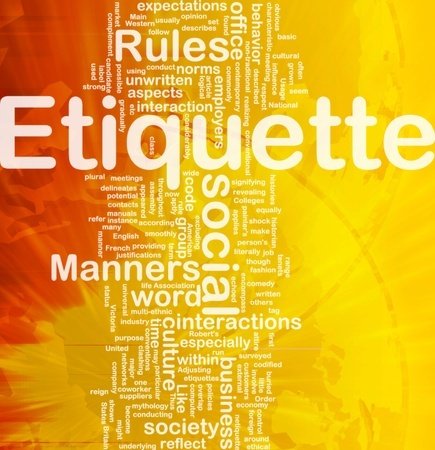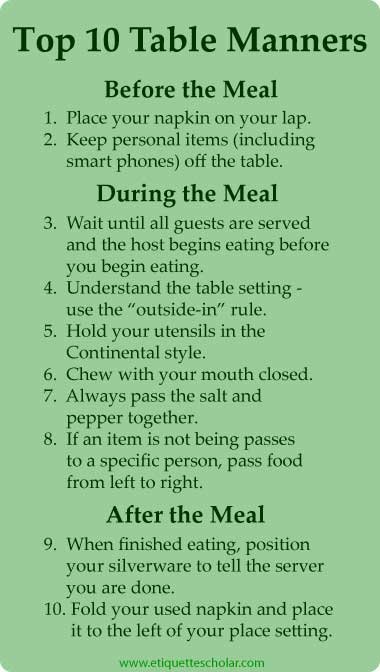Etiquette
/ˈɛtɪkɛt,ɛtɪˈkɛt/
Noun
The word "etiquette" comes from the French word "estique," meaning to attach or to stick.

What Is Etiquette?
When many people think about etiquette, the first thing that pops into their minds is knowing which fork to use at a formal dinner or how to shake hands with someone. While those are important things to know, it doesn't really get to the foundation of what etiquette is.
"Etiquette" describes the requirements of behaviors according to conventions of society. It includes the proper conduct that is established by a community for various occasions, including ceremonies, court, formal events and everyday life.
Etiquette can also be said to be the customary code of polite behaviour in society or among members of a particular profession or group.
Etiquette begins at home, the reason many young people today do not know much about etiquette is because they never learned it at home, parents no longer directly teach children and teenagers etiquette.
Types of Etiquette.
So there are various types of etiquette,some of which are listed below, these are just a few:
Social Etiquette - Social etiquette is important for an individual as it teaches him how to behave in the society.
Bathroom Etiquette- Bathroom etiquette refers to the set of rules which an individual needs to follow while using public restrooms or office toilets. Make sure you leave the restroom clean and tidy for the other person.
Corporate Etiquette- Corporate Etiquette refers to how an individual should behave while he is at work. Each one needs to maintain the decorum of the organization. Don’t loiter around unnecessary or peep into other’s cubicles.
Wedding Etiquette- Wedding is a special event in every one’s life. Individuals should ensure they behave sensibly at weddings. Never be late to weddings or drink uncontrollably.
Meeting Etiquette- Meeting Etiquette refers to styles one need to adopt when he is attending any meeting, seminar, presentation and so on. Listen to what the other person has to say. Never enter meeting room without a notepad and pen. It is important to jot down important points for future reference.
Telephone Etiquette- It is essential to learn how one should interact with the other person over the phone. Telephone etiquette refers to the way an individual should speak on the phone. Never put the other person on long holds. Make sure you greet the other person. Take care of your pitch and tone.
Eating Etiquette- Individuals must follow certain decorum while eating in public. Don’t make noise while eating. One should not leave the table unless and until everyone has finished eating.

Business Etiquette- Business Etiquette includes ways to conduct a certain business. Don’t ever cheat customers. It is simply unethical.
The Importance of Etiquette.
Most etiquette experts agree that proper etiquette begins by showing respect for others, being honest and trustworthy, putting others at ease, and showing kindness and courtesy to others.
Some people argue that etiquette no longer matters, that the rules for good behavior are old-fashioned and out of date. However, good behavior and manners are never out of style. Etiquette, like all other cultural behaviors, evolves to match the times. Without etiquette, members of society would show far too much impatience and disrespect for one another, which would lead to insults, dishonesty, cheating, road rage, fist fights, and a rash of other unfortunate incidents.
Etiquette in Today's Society,
Today's etiquette serves several important functions:
1.Etiquette provides personal security, knowing how to behave appropriately in a given situation makes you more comfortable.
2.It protects the feelings of others, proper etiquette requires that you make others comfortable and protect their feelings. You do not point out their errors or draw attention to their mistakes.
3.It makes good first impressions, the first five to seven seconds after you meet someone are crucial, your first impression lingers in the other person's mind long after you are gone. If you use proper etiquette, that first impression will be a positive one.
4.It makes communication clearer, etiquette enhances communication by breaking down barriers, not erecting them.
5.It will enhance your status at work. In any working situation, you are perceived as more capable, more professional, and more intelligent if you are familiar with the proper code of conduct for the workplace.
Society and our culture are now changing so fast that it is hard for the rules of etiquette to keep up. As quickly as a book of etiquette is published, a new form of communication is developed or a new style of dating becomes all the rage and someone declares the latest etiquette book "hopelessly outdated."
Etiquette is meant to be a guideline, not a set of strict rules carved in stone.
Those guidelines are developed using common sense, a sense of fairness, politeness, and above all, consideration for others. if you let consideration for others be your priority , you will be well on your way to being the kind of polite person who understands the rules of etiquette instinctively.
i urge you therefore to henceforth practice hight standards of etiquette at home. Be sure to be polite and kind toward your spouse, parents,siblings,relatives and/or children, especially children, so they will learn from example the proper way to treat other people. If they grow up with etiquette ingrained in them, they will find it easier to form lasting relationships, be successful, and move through life as the kind of people others enjoy being around.
You also will find that etiquette becomes second nature to you rather than a set of rules, and your own life will be more pleasant. People respond positively to those who are nice to them and who treat them with respect.
i know for sure that etiquette will definitely always matter.
Thanks for reading.
Please kindly
UPVOTE,COMMENT AND RESTEEM.
Enjoy your day.